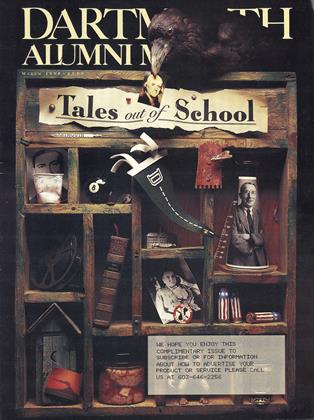I FIRST WENT to see English professor John Boly in the fall of my senior year, to discuss the possibility of his supervising my thesis on the poetry of Yeats. He asked to see some of my prior work. "What does this mean?" he politely inquired, pointing to some such phrase as "the ineffable essence of being" in a paper I was, in fact, quite proud of.
"Well, you know, it's a little difficult to explain," I replied weakly. "If it's a little difficult to explain," he said firmly, "then you don't really understand it."
Before I began writing my thesis. John Boly had me do a 300- word, then a 150-word, and finally a 75-word precis. "But this is going to be a hundred-page paper!" I remember protesting.
Boly was unmoved. "The essence of really fine writing," he explained, "is to hold a simple idea firmly in mind and then to dance around it, to bounce off it. It doesn't mean that the problems you are writing about are simple. But if you yourself aren't absolutely clear bout what you think those issues are. then no one else is going to understand them either. No matter how much, or how charmingly, you write."
1 seldom think about that thesis anymore, or about the trees' worth of paper I wasted in false starts and wrong turns. But I often think of Professor Boly, and of his gentle but hard-nosed insistence that I pay as much attention to the questions as to the answers.
 View Full Issue
View Full Issue
More From This Issue
-
 Cover Story
Cover StoryGetting Things Right
March 1995 By Donald Goss '53 -
 Cover Story
Cover StoryThe Tasting
March 1995 By John R. Scotford Jr. '38 -
 Cover Story
Cover StoryCox, Poe, and Jefferson's Dead Body
March 1995 By Peter Gilbert '76 -
 Cover Story
Cover StoryDiseased With Poetry
March 1995 By Everett Wood '38 -
 Cover Story
Cover StoryQuite Good
March 1995 By Abner Oakes IV '81 -
 Cover Story
Cover StoryPoesis
March 1995 By David Bradley '38
Mary Cleary Kiely '79
Features
-
 Feature
FeatureDartmouth in the Public Service
APRIL 1963 -
 Feature
FeatureBOSTON'S 100th ANNIVERSARY DINNER
MARCH 1964 -
 Feature
FeatureThe 50-Year Address
JULY 1969 By DR. ROBERT M. STECHER '19 -
 Feature
Feature"What We Are After"
May 1960 By EDWARD T. CHAMBERLAIN JR. -
 Feature
FeatureBaker Holds the Key
DECEMBER 1965 By JAMES W. FERNANDEZ




